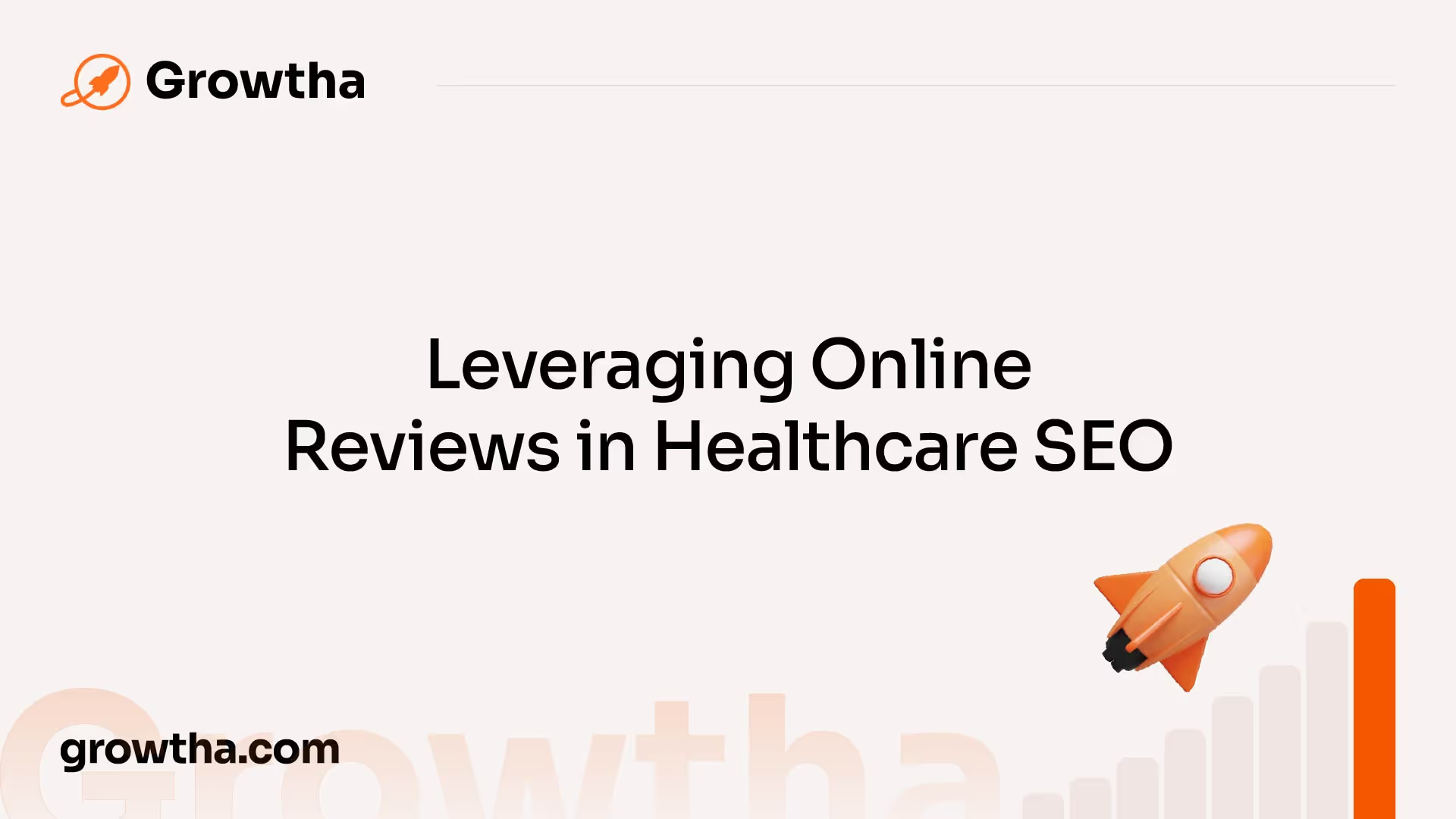Healthcare SEO for Online Reviews
To thrive in today's digital landscape, healthcare providers need to prioritize their online presence.


Healthcare SEO for Online Reviews
Want more 5-Star Google Business Reviews? Click Here
Importance of Healthcare SEO
To thrive in today's digital landscape, healthcare providers need to prioritize their online presence. This is where healthcare SEO (Search Engine Optimization) comes into play. Healthcare SEO is a systematic approach to improving a medical website's search engine ranking with the goal of attracting more organic traffic and expanding online visibility.
Healthcare SEO Overview
Healthcare SEO involves optimizing a medical website to ensure it ranks higher in search engine results when potential patients search for relevant healthcare information or services. By utilizing various SEO techniques, healthcare providers can increase their visibility, reach a wider audience, and attract more potential patients. It's an essential part of digital marketing strategies for healthcare organizations.

Benefits of Healthcare SEO
Implementing effective healthcare SEO strategies offers numerous benefits for healthcare providers:
- Increased online visibility: With the majority of patients now searching online for healthcare services and providers, having a strong online presence is crucial. By optimizing their website for search engines, healthcare providers can increase their visibility and attract potential patients who are actively looking for their services.
- Expanded reach: The healthcare industry in the United States is rapidly growing, and providers have the opportunity to capitalize on this expansion by implementing effective healthcare SEO strategies. By reaching a wider audience, healthcare providers can attract patients from different geographical locations and expand their business.
- Improved credibility: Online reviews play a significant role in the evaluation process of doctors. Approximately 94% of patients use online reviews to evaluate healthcare providers [2]. By managing and leveraging online reviews, healthcare providers can build trust, establish credibility, and differentiate themselves from competitors.
- Increased patient acquisition: By optimizing their website and content for relevant keywords, healthcare providers can attract more qualified organic traffic. This, in turn, can lead to an increase in patient acquisition and appointments. A well-executed healthcare SEO strategy can drive targeted traffic to a provider's website, resulting in more conversions and new patients.
- Cost-effective marketing: Compared to traditional marketing methods, healthcare SEO can be a cost-effective way to reach potential patients. By focusing on organic search results, healthcare providers can reduce their reliance on paid advertising and achieve sustainable long-term results.
By understanding the importance of healthcare SEO and the benefits it offers, healthcare providers can effectively leverage this strategy to improve their online presence, attract more patients, and stay ahead in the competitive healthcare industry.
Challenges in Healthcare Marketing

Healthcare marketers face a unique set of challenges when it comes to marketing their services. Two significant hurdles they encounter are HIPAA compliance restrictions and tight marketing budgets.
HIPAA Compliance Restrictions
HIPAA (Health Insurance Portability and Accountability Act) compliance plays a vital role in healthcare marketing. The act sets strict guidelines for the use and disclosure of Protected Health Information (PHI) without explicit patient consent. This means that healthcare marketers have limitations on targeting methods and market segmentation, as they cannot target individual patients based on specific health conditions or treatments without consent [3].
The restrictions imposed by HIPAA are in place to protect patient privacy and maintain the confidentiality of their health information. While this is crucial for safeguarding patient trust, it can present challenges for healthcare marketers looking to personalize their marketing efforts.
Tight Marketing Budgets
Another challenge healthcare marketers face is working with tight marketing budgets. Many healthcare organizations have limited resources allocated to marketing initiatives. This can restrict their ability to invest in comprehensive marketing campaigns and employ various marketing strategies to reach their target audience effectively.
With limited budgets, healthcare marketers must prioritize their marketing efforts and find cost-effective strategies that yield the best results. This may involve focusing on targeted online marketing channels, optimizing their online presence, and leveraging organic search engine optimization (SEO) techniques to maximize their reach within the constraints of their budget.
Despite these challenges, healthcare marketers can overcome them by strategically planning their marketing initiatives, ensuring HIPAA compliance, and exploring innovative and cost-effective marketing approaches. By understanding the unique constraints they face, healthcare marketers can navigate these challenges and continue to effectively promote their services while maintaining patient privacy and working within their budgetary limitations.
Leveraging Online Reviews in Healthcare SEO

Online reviews play a crucial role in healthcare marketing, significantly influencing patient decisions. Positive reviews not only build trust and credibility but also contribute to a healthcare business's online reputation, attracting more patients [3]. In the realm of healthcare SEO, positive online reviews are especially valuable, as they can enhance a healthcare business's online presence and visibility.
Role of Online Reviews in Healthcare Marketing
In the digital age, patients often turn to online reviews to gather insights and make informed decisions about healthcare providers. According to recent research, 81% of patients evaluate reviews before choosing a healthcare provider, highlighting the significant impact of online reputation on new patient acquisition.
Positive online reviews not only serve as testimonials from satisfied patients but also contribute to the search engine optimization (SEO) efforts of healthcare businesses. Great healthcare SEO can lead to positive reviews, which, in turn, improve the online reputation of the healthcare business, attract more patients, and enhance its visibility in search engine results.
To leverage online reviews effectively, healthcare businesses can utilize social media pages and Google Business Profiles to collect reviews from patients. By making it easy for customers to leave reviews and actively engaging with patients who have had positive experiences, healthcare businesses can build trust, foster patient satisfaction, and attract more patients [5].
Strategies for Managing Online Reviews
Managing online reviews is critical for healthcare businesses to maintain a positive online reputation and ensure patient satisfaction. Here are some strategies for effectively managing online reviews:
- Monitor and Respond: Regularly monitor online review platforms and social media channels to stay informed about patient feedback. Respond promptly and professionally to both positive and negative reviews. Addressing negative reviews with empathy and offering solutions demonstrates a commitment to patient satisfaction.
- Encourage Positive Reviews: Actively encourage satisfied patients to leave reviews by providing clear instructions and links on social media pages, websites, and email communications. Highlight the importance of their feedback and how it helps improve the quality of care.
- Address Negative Reviews: When encountering negative reviews, take the opportunity to showcase a commitment to resolving issues and improving patient experiences. Responding with empathy, offering solutions, and taking the conversation offline can help mitigate the impact of negative reviews.
- Learn from Feedback: Analyze online reviews to identify trends and areas for improvement. Use the feedback to enhance patient experiences and address any common concerns. This proactive approach can lead to positive changes and further improve the reputation of the healthcare business.
By effectively managing online reviews, healthcare businesses can build trust, enhance their online reputation, and attract more patients. When combined with effective healthcare SEO strategies, online reviews become a powerful tool for driving visibility and success in the digital landscape.
Implementing AI in Healthcare Marketing

Artificial Intelligence (AI) is revolutionizing the healthcare industry, and its potential in marketing is no exception. By utilizing AI, healthcare marketers can enhance their strategies, improve targeting methods, and create personalized patient experiences. Let's explore two key aspects of implementing AI in healthcare marketing: utilizing AI for targeted marketing and personalized patient experiences.
Utilizing AI for Targeted Marketing
Implementing AI in healthcare marketing enables more effective targeting methods and market segmentation. AI algorithms analyze vast amounts of data, allowing marketers to identify patterns and trends that inform their decision-making process. With AI, healthcare marketers can optimize their campaigns, ensuring that their messages reach the right audience at the right time.
By leveraging AI, healthcare marketers can:
- Identify target audiences: AI algorithms analyze demographic data, online behavior, and other relevant factors to identify the most suitable target audience for specific campaigns.
- Improve campaign performance: AI can analyze large datasets to identify patterns and trends, enabling marketers to optimize their campaigns for maximum effectiveness.
- Automate personalized messaging: AI-powered tools can generate personalized messages based on individual patient data, allowing for tailored communication that resonates with the intended recipients.
The use of AI in targeted marketing provides healthcare organizations with valuable insights and improves the efficiency and impact of their marketing efforts.
Personalized Patient Experiences
AI can play a significant role in delivering personalized experiences to patients. By analyzing patient data and behavior, AI algorithms can create tailored recommendations, targeted messaging, and personalized content that aligns with the unique needs and preferences of each patient. This level of personalization enhances patient engagement and satisfaction while fostering a sense of trust and loyalty.
Implementing AI for personalized patient experiences involves:
- Analyzing patient data: AI algorithms can process large volumes of patient data, including medical history, preferences, and interactions, to gain insights into individual patient needs.
- Tailored recommendations: AI can generate recommendations for treatments, preventive measures, and relevant healthcare services based on a patient's specific conditions and circumstances.
- Targeted messaging: AI-powered communication tools can deliver targeted messages to patients, addressing their unique concerns and providing them with the information they need at the right time.
It's important to note that when implementing AI in healthcare marketing, organizations must adhere to data privacy regulations and ensure the protection of patient information [3]. Safeguarding patient privacy and maintaining data security are paramount in all AI-driven initiatives.
By harnessing the power of AI, healthcare marketers can optimize their campaigns, deliver personalized experiences, and make data-driven decisions that enhance patient satisfaction and engagement. As technology continues to advance, the role of AI in healthcare marketing will undoubtedly evolve, providing even greater opportunities for healthcare organizations to connect with patients effectively.
Strategies for Effective Healthcare SEO

To ensure the success of healthcare SEO efforts, implementing effective strategies is crucial. Two key strategies that play a significant role in healthcare SEO are content creation and keyword research, as well as local SEO optimization.
Content Creation and Keyword Research
Content creation and keyword research are essential aspects of healthcare SEO. By creating helpful and informative content that is based on relevant keywords, healthcare facilities can attract and engage their target audience. Targeting keywords related to the healthcare business's area of expertise allows them to rank higher in search engine results and increase their visibility to potential patients [5].
To identify relevant keywords, healthcare businesses can utilize tools like Keyword Gap to find keywords that their competitors rank for but they do not. By incorporating these keywords into their content, they can improve their chances of ranking higher in search engine results and attracting more organic traffic.
Additionally, it's important to create content that answers the questions and addresses the concerns of the target audience. By providing valuable information and solutions to their queries, healthcare facilities can establish themselves as trusted sources of information and gain the attention and trust of potential patients.
Local SEO Optimization
Local SEO optimization is vital for healthcare businesses targeting a specific geographic area. Optimizing for local SEO helps healthcare facilities appear in local search results when potential patients search for services in their area. This can significantly increase visibility and attract relevant leads.
One effective way to optimize for local SEO is by claiming and optimizing the Google My Business (GMB) profile. This involves providing accurate and up-to-date information about the healthcare facility, such as address, phone number, and operating hours. Healthcare businesses should also encourage patients to leave reviews on their GMB profile to build trust and improve their online reputation.
Furthermore, building backlinks from reputable local directories and websites specific to the healthcare industry can also enhance local SEO. This helps search engines understand the relevance and authority of the healthcare facility, increasing its chances of appearing in local search results.
By implementing these strategies for effective healthcare SEO, healthcare facilities can improve their online presence, attract relevant leads, and establish themselves as trusted sources in their respective communities.
Building Trust Through Online Reviews
In the realm of healthcare SEO, building trust is essential for the success of any healthcare practice. Online reviews play a significant role in influencing patient decisions and establishing credibility. This section will explore the impact of online reviews on patient decisions and provide strategies for encouraging patient engagement.
Impact of Online Reviews on Patient Decisions
According to recent research, a staggering 81% of patients evaluate reviews before choosing a healthcare provider [4]. This emphasizes the importance of online reviews in healthcare marketing. Positive reviews can build trust and credibility, showcasing a commitment to patient satisfaction. On the other hand, negative reviews can be mitigated through effective handling strategies, which demonstrate a willingness to address concerns and improve patient experiences [3].
Online reviews help prospective patients understand the level of patient care provided by a healthcare provider. They provide valuable insights that assist patients in selecting the right doctors for their healthcare needs [4]. Consistent and positive reviews can demonstrate to potential patients that current patients are satisfied with the care provided by a healthcare practice. This positive online reputation helps build trust and confidence in the practice, ultimately influencing patient decisions and driving new patient acquisition.
Encouraging Patient Engagement
To leverage the power of online reviews, healthcare practices should actively encourage patients to leave reviews. Here are some strategies for enhancing patient engagement:
- Request Reviews: After providing exceptional care, healthcare providers can politely request that satisfied patients share their experiences through online reviews. This can be done through follow-up emails, personalized messages, or even in-person conversations.
- Make It Easy: Streamline the review process by providing patients with direct links to review sites or featuring review widgets on the practice's website. This simplifies the process and increases the likelihood of patients leaving reviews.
- Incentivize Feedback: Consider offering incentives, such as discounts on future services or entry into a prize draw, to encourage patients to provide feedback. However, it's important to adhere to relevant regulations and ethical guidelines when implementing any incentivization strategy.
- Respond to Reviews: Actively engage with patients by responding to reviews, both positive and negative. Express gratitude for positive feedback, and address concerns raised in negative reviews with empathy and a commitment to resolving the issue. This demonstrates a dedication to patient satisfaction and showcases transparency to prospective patients.
By implementing these strategies, healthcare practices can encourage patients to leave reviews and actively manage their online reputation. This can lead to acquiring and retaining more patients, as well as promoting overall business growth [4]. Building trust through online reviews is a crucial aspect of healthcare SEO, enabling practices to attract and retain patients in an increasingly competitive digital landscape.
References
[1]: https://surferseo.com/blog/healthcare-seo/
[2]: https://www.medicaleconomics.com/view/online-reviews-are-becoming-more-important-to-patients-in-choosing-their-care-how-to-manage-your-online-reputation-in-health-care
[3]: https://www.weareamnet.com/blog/healthcare-marketing-challenges/
[4]: https://www.forbes.com/sites/forbescommunicationscouncil/2022/01/12/why-does-online-reputation-matter-for-healthcare-practices/







